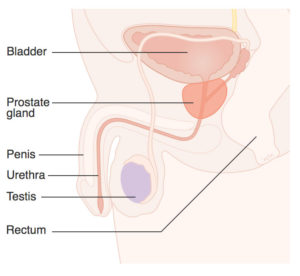Many common health problems are shared by both men and women. However, there are certain problems that affect men differently to women. Additionally, there are a variety of existing conditions that concern men only. These health problems include conditions that are associated with the prostate and/or genitalia. Many of the problems men experience may be largely age-related or they may be caused by trauma, disease, cancer, infection, nerve damage and/or obesity to name a but a few.
Physiotherapy with Sydney Men’s Health Physiotherapy will help you overcome the problems you have been experiencing, prevent future problems, reduce any embarrassment associated with Men’s health dysfunctions and help you to return to the normal everyday living.
What Men’s Health conditions do we treat?
Prostate cancer-related issues
Pre-operative prostatectomy motor learning program
Post-operative prostatectomy rehabilitation program
Incontinence Issues
Stress, Frequency and Urgency
Bladder training for irritable bladder syndromes
Urinary urgency problems
Post-Micturition Dribble
Erectile Dysfunction
Chronic Pelvic Pain Syndrome
Why choose us?
- Quite simply, Stuart and his team are the leaders in Physiotherapy treatment of Men’s Health problems
- We use the absolute latest, cutting-edge technology and treatment to ensure the best possible outcome for you in the shortest possible timeframe.
- Our Men’s Health Physiotherapy staff are not only highly qualified, they are also incredibly personable and caring.
Men’s Health Treatment information
Prostate Cancer Related Issues
Prostate cancer is the most commonly diagnosed male cancer. It has a higher prevalence in men than breast cancer does in women.
The prostate gland is a walnut-sized gland, which is located at the very base of the bladder.
One of the treatment options for prostate cancer is radical prostatectomy, complete surgical removal of this gland. This is a very successful way of eradicating cancer but it can lead to long-term issues of urinary incontinence and erectile dysfunction.
At Sydney Men’s Health Physiotherapy our focus has been on using real-time ultrasound (RTUS) as a biofeedback tool to allow men to visualise the pelvic floor muscles (PFM) moving. In this way, we can more accurately teach the ‘feel’ of a good quality pelvic floor muscle contraction. Repetition of a high-quality technique is much more likely to produce better outcomes than repetition of a poor technique. Once good technique has been perfected we develop a tailored progressive strength program that will develop the strength of the voluntary muscle system.
It is important that the two functions of the pelvic floor are trained in separate ways.
- Endurance – targets postural control and ability to contract for long periods of time
- Strength – developed via a progressive, guided strength program
Just like all strength programs you have to make sure you are being challenged up to, but not beyond, your capacity. Again we utilise the ultrasound to objectively test how hard you are able to work so we get the optimal strength development outcomes for you.
A visualisation of our model of care is shown below.
Identify
|
Develop
|
Integrate
|
Automate
Stuart and his team at SMHP are producing ground-breaking research in this area, looking at new and innovative ways of optimising pelvic floor health. The outcomes of this research will see significant clinical improvements incontinence and erectile function following prostatectomy.
Incontinence issues (stress, frequency and urgency) and irritable bladders are dealt with in a similar fashion as above, ensuring that pelvic floor muscle tone is optimised. But here we also focus on bladder retraining. By utilising both physical, mental and cognitive behavioural strategies we aim to defer the urge to urinate, restore more normal urinary function and settle bladder irritability.
Post-micturition dribble is what can happen when, after you have finished urinating and have zipped up, a small amount of urine drips out of your penis. The volume of urine leaking out can vary from very small and insignificant to quite voluminous and disabling. Although the mainstay here is also pelvic floor muscle training there are other strategies we can educate you about to assist with management of this embarrassing issue.
Erectile dysfunction (ED) is a complex medical condition and will often need to be assessed in a multimodal fashion by specialist men’s health physicians, clinical psychologists and urologists as well as by physiotherapists. There is considerable data to suggest that PFM strengthening is effective for some people with erectile dysfunction and it can do no harm to optimise pelvic floor muscle health to improve ED outcomes.
Chronic pelvic pain is persistent pain located in and around the pelvic floor (perineal) region. It is thought it may be due to excessive tightness in muscular tissue and can cause significant pain and disability. Treatment involves a thorough examination of the muscular and ligamentous tissue in and around the pelvis and targeted release of localised myofascial trigger points. (hyperexcitable regions within the muscle fibres).
If you suffer from any of the above please contact the team at SSOP to make an appointment with one of our Mens Health Physios. Please ensure you book with the Men’s Health Physiotherapists, as this is a highly specific area in Physiotherapy and will ensure you receive the absolute best assessment and treatment available.


